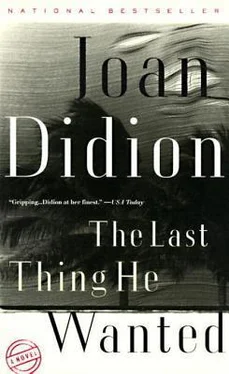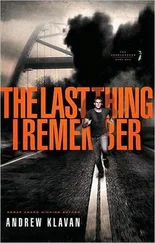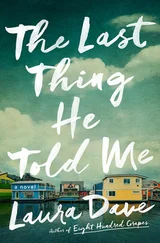If you remember 1984, which I notice fewer and fewer of us care to do, you already know some of what happened to Elena McMahon that summer. You know the context, you remember the names, Theodore Shackley Clair George Dewey Clarridge Richard Secord Alan Fiers Felix Rodriguez aka “Max Gomez” John Hull Southern Air Lake Resources Stanford Technology Donald Gregg Aguacate Elliott Abrams Robert Owen aka “T.C.” Ilopango aka “Cincinnati,” all swimming together in the glare off the C-123 that fell from the sky into Nicaragua. Not many women got caught in this glare. There was one, the blonde, the shredder, the one who transposed the numbers of the account at the Credit Suisse (the account at the Credit Suisse into which the Sultan of Brunei was to transfer the ten million dollars, in case you have forgotten the minor plays), but she had only a bit part, day work, a broadly comic but not in the end a featured role.
Elena McMahon was different.
Elena McMahon got caught, but not in the glare.
If you wanted to see how she got caught you would probably begin with the documents.
There are documents, more than you might think.
Depositions, testimony, cable traffic, some of it not yet declassified but much in the public record.
You could pick up a thread or two in the usual libraries: Congress of course. The Foreign Policy Institute at Hopkins, the Center for Strategic and International Studies at Georgetown. The Sterling at Yale for the Brokaw correspondence. The Bancroft at Berkeley, where Treat Morrison’s papers went after his death.
There are the FBI interviews, none what I would call illuminating but each offering the occasional moment (the chocolate parfait and bacon is one such moment in the transcripts of the FBI interviews), the leading detail (I found it suggestive that the subject who mentioned the parfait and bacon to the FBI was not in fact Treat Morrison), the evasion so blatant that it inadvertently billboards the very fact meant to be obscured.
There are the published transcripts of the hearings before the select committee, ten volumes, two thousand five hundred and seven pages, sixty-three days of testimony arresting not only for its reliance on hydraulic imagery (there were the conduits, there was the pipeline, there was of course the diversion) but for its collateral glimpses of life on the far frontiers of the Monroe Doctrine. There was for example the airline that operated out of St. Lucia but had its headquarters in Frankfurt (Volume VII, Chapter 4, “Implementing the Decision to Take Policy Underground”) and either was or was not (conflicting testimony on this) ninety-nine percent owned by a former Air West flight attendant who either did or did not live on St. Lucia. There was for example the team of unidentified men (Volume X, Chapter 2, “Supplemental Material on the Diversion”) who either did or did not (more conflicting testimony) arrive on the northern Costa Rican border to burn the bodies of the crew of the unmarked DC-3 that at the time it crashed appeared to be registered to the airline that was or was not ninety-nine percent owned by the former Sky West flight attendant who did or did not live on St. Lucia.
There is of course newspaper coverage, much of it less than fruitful: although a comprehensive database search on McMahon, Elena will yield, for the year in question, upwards of six hundred references in almost as many newspapers, all but a handful of them lead to the same two AP stories.
History’s rough draft.
We used to say.
When we still believed that history merited a second look.
Not that this was a situation about which many people would have been willing to talk for attribution, or even on background. As someone who quite accidentally happened to be present at the embassy in question at the time in question, I myself refused a dozen or so press requests for interviews. At the time, I chose to believe that I refused such requests because they seemed to impinge on what was then my own rather delicate project, a preliminary profile of Treat Morrison for The New York Times Magazine, to be followed, if this exploratory drilling went as hoped, by a full-scale study of his proconsular role through six administrations, but it was a little more than that.
I refused such requests because I did not want to be drawn into discussion of whatever elements seemed questionable, whatever details seemed not to be trusted, whatever logical connections seemed to be missing between the Elena Janklow I had known in California (Catherine Janklow’s mother, Wynn Janklow’s wife, co-chair, committee member, arranger of centerpieces and table favors for a full calendar of benefit lunches and dinners and performances and fashion shows, originator in fact of the locally famous No Ball Ball, enabling the benevolent to send in their checks and stay home) and the Elena McMahon in the two AP stories.
I could find no reasonable excuse not to participate in the subsequent study in crisis management undertaken by the Rand Corporation on behalf of DOD/State, but I was careful: I adopted the vernacular of such studies. I talked about “conflict resolution.” I talked about “incident prevention.” I did provide facts, more facts even than I was asked to provide, but facts of such stupefying detail and doubtful relevance that none of the several Rand analysts engaged in the project thought to ask the one question I did not want to answer.
The question of course was what did I think had happened.
I thought she got caught in the pipeline, swept into the conduits.
I thought the water was over her head.
I thought she realized what she had been set up to do only in however many elongated seconds there were between the time she registered the presence of the man on the bluff and the time it happened.
I still think this.
I say so now only because real questions have occurred to me.
About the events in question.
At the embassy in question.
At the time in question.
You may recall the rhetoric of the time in question.
This wasn’t a situation that lent itself to an MBA analysis.
This wasn’t a zero-sum deal.
In a perfect world we might have perfect choices, in the real world we had real choices, and we made them, and we measured the losses against what might have been the gains.
Real world.
There was no doubt certain things happened we might have wished hadn’t happened.
There was no doubt we were dealing with forces that might or might not include unpredictable elements.
Elements beyond our control.
No doubt, no argument at all.
And yet.
Still.
Consider the alternatives: trying to create a context for democracy and maybe getting your hands a little dirty in the process or just opting out, letting the other guy call it.
Add it up.
I did that.
I added it up.
Not zero-sum at all.
You could call this a reconstruction. A corrective, if you will, to the Rand study. A revisionist view of a time and a place and an incident about which, ultimately, most people preferred not to know. Real world.
If I could believe (as convention tells us) that character is destiny and the past prologue et cetera, I might begin the story of what happened to Elena McMahon during the summer of 1984 at some earlier point. I might begin it in, say, 1964, the year during which Elena McMahon lost her scholarship to the University of Nevada and within a week invented herself as a reporter for the Los Angeles Herald Examiner. I might begin it four years later, in 1968, the year during which, in the course of researching a backgrounder on the development of the oil business in southern California, Elena McMahon met Wynn Janklow in his father’s office on Wilshire Boulevard and, with such single-minded efficiency that she never bothered to write the piece, reinvented herself as his wife.
Читать дальше












